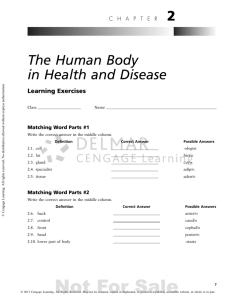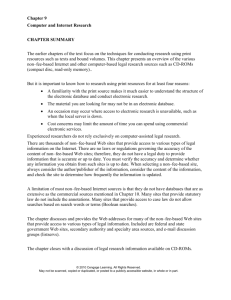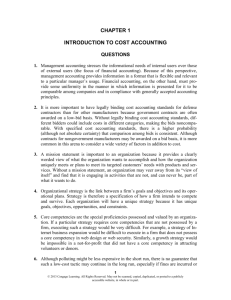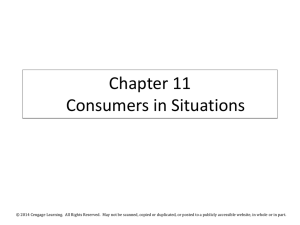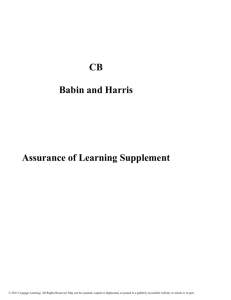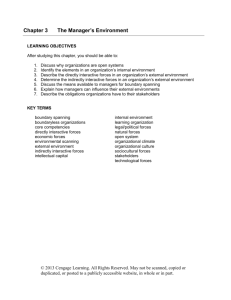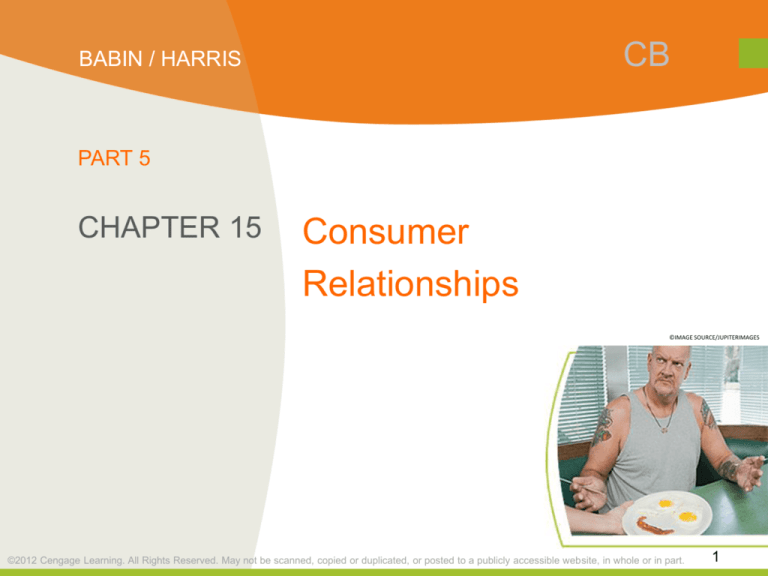
CB
BABIN / HARRIS
PART 5
CHAPTER 15
Consumer
Relationships
©IMAGE SOURCE/JUPITERIMAGES
©2012 Cengage Learning. All Rights Reserved. May not be scanned, copied or duplicated, or posted to a publicly accessible website, in whole or in part.
1
Learning Outcomes
LO1
List and define the behavioral outcomes of consumption.
LO2
Know why consumers complain and the ramifications of
complaining behavior for a marketing firm.
LO3
Use the concept of switching costs to understand why
consumers do or do not repeat purchase behavior.
LO4
Describe each component of true consumer loyalty.
LO5
Understand the role that value plays in shaping loyalty and
building consumer relationships.
©2012 Cengage Learning. All Rights Reserved. May not be scanned, copied or duplicated, or posted to a publicly accessible website, in whole or in part.
2
LO1
List and define the behavioral
outcomes of consumption.
©2012 Cengage Learning. All Rights Reserved. May not be scanned, copied or duplicated, or posted to a publicly accessible website, in whole or in part.
3
Exhibit 15.1: A More Detailed Look
LO1 at Postconsumption Reactions
©2012 Cengage Learning. All Rights Reserved. May not be scanned, copied or duplicated, or posted to a publicly accessible website, in whole or in part.
4
LO2
Know why consumers complain
and the ramifications of
complaining behavior for a
marketing firm.
©2012 Cengage Learning. All Rights Reserved. May not be scanned, copied or duplicated, or posted to a publicly accessible website, in whole or in part.
5
LO2
Complaining Behavior
©2012 Cengage Learning. All Rights Reserved. May not be scanned, copied or duplicated, or posted to a publicly accessible website, in whole or in part.
©ISTOCKPHOTO.COM/MARCUS CLACKSON
Occurs when a consumer
actively seeks out someone
to share an opinion with
regarding a negative
consumption event.
6
LO2
Exhibit 15.2: The Complainer versus the
Noncomplainer and Negative Word-ofMouth
©2012 Cengage Learning. All Rights Reserved. May not be scanned, copied or duplicated, or posted to a publicly accessible website, in whole or in part.
7
LO2
Handling Service Complaints
Effectively
• Thank the guest for providing the information.
• Ask questions to clarify the issue.
• Apologize sincerely.
• Show empathy for the customer’s situation.
• Explain the corrective action that will take
place.
• Act quickly.
• Follow up with the customer after the
corrective action.
©2012 Cengage Learning. All Rights Reserved. May not be scanned, copied or duplicated, or posted to a publicly accessible website, in whole or in part.
8
LO2 Results of Not Complaining
What happens when the consumer doesn’t complain?
- Remember the incident; be less likely to do business there again
- Complain to others
Consumers may retaliate with revenge-oriented behaviors.
Rancorous revenge—a consumer yells, insults, and makes a
public scene in an effort to harm the business in response to
an unsatisfactory experience.
Retaliatory revenge—a consumer becomes violent with
employees and/or tries to vandalize a business in response to
an unsatisfactory experience.
©2012 Cengage Learning. All Rights Reserved. May not be scanned, copied or duplicated, or posted to a publicly accessible website, in whole or in part.
9
LO2
Word-of-Mouth (WOM)
Negative WOM
Takes place when
consumers pass
on negative
information about a
company from one
to another.
©2012 Cengage Learning. All Rights Reserved. May not be scanned, copied or duplicated, or posted to a publicly accessible website, in whole or in part.
10
LO2
Word-of-Mouth (WOM)
©ISTOCKPHOTO.COM/GRAFISSIMO
•
•
•
•
•
•
Negative public publicity
Doing nothing or denying responsibility
Taking responsibility
Releasing information
Participating in negative WOM
Implications of negative WOM
The media are a vehicle for both
spreading negative publicity and
for managing the implications of
negative publicity.
©2012 Cengage Learning. All Rights Reserved. May not be scanned, copied or duplicated, or posted to a publicly accessible website, in whole or in part.
11
LO3
Use the concept of switching
costs to understand why
consumers do or do not repeat
purchase behavior.
©2012 Cengage Learning. All Rights Reserved. May not be scanned, copied or duplicated, or posted to a publicly accessible website, in whole or in part.
12
LO3
Switching Behavior
Refers to the times when a
consumer chooses a
competing choice, rather
than the previously
purchased choice, on the
next purchase occasion.
©2012 Cengage Learning. All Rights Reserved. May not be scanned, copied or duplicated, or posted to a publicly accessible website, in whole or in part.
13
Switching Costs
©ISTOCKPHOTO.COM/MURAT BAYSAN
LO3
Procedural
Financial
Relational
©2012 Cengage Learning. All Rights Reserved. May not be scanned, copied or duplicated, or posted to a publicly accessible website, in whole or in part.
14
LO3
Exhibit 15.3: Factors Contributing
to Switching Costs
©2012 Cengage Learning. All Rights Reserved. May not be scanned, copied or duplicated, or posted to a publicly accessible website, in whole or in part.
15
LO3
Exhibit 15.4: Vulnerability to
Defections Based on CS/D
Dissatisfaction does not always mean
that the customer is going to switch.
©2012 Cengage Learning. All Rights Reserved. May not be scanned, copied or duplicated, or posted to a publicly accessible website, in whole or in part.
16
LO4
Describe each component of true
consumer loyalty.
©2012 Cengage Learning. All Rights Reserved. May not be scanned, copied or duplicated, or posted to a publicly accessible website, in whole or in part.
17
LO4
Customer Share
The portion of resources
allocated to one brand from
among the set of competing
brands.
©2012 Cengage Learning. All Rights Reserved. May not be scanned, copied or duplicated, or posted to a publicly accessible website, in whole or in part.
18
Exhibit 15.5: Customer Share
LO4 Information for Two Coffee Shop
Customers
©2012 Cengage Learning. All Rights Reserved. May not be scanned, copied or duplicated, or posted to a publicly accessible website, in whole or in part.
19
LO4
Customer Inertia
Situation in which
a consumer tends
to continue a
pattern of behavior
until some
stronger force
motivates him or
her to change.
©ISTOCKPHOTO.COM/FRANK BOELLMANN
©2012 Cengage Learning. All Rights Reserved. May not be scanned, copied or duplicated, or posted to a publicly accessible website, in whole or in part.
20
LO4
Customer Commitment
A strong feeling of
attachment, dedication, and
sense of identification with a
brand.
©2012 Cengage Learning. All Rights Reserved. May not be scanned, copied or duplicated, or posted to a publicly accessible website, in whole or in part.
21
LO4 Exhibit 15.6: True Loyalty Requires
Customer Commitment
©2012 Cengage Learning. All Rights Reserved. May not be scanned, copied or duplicated, or posted to a publicly accessible website, in whole or in part.
22
LO4
Antiloyal Consumers
Those who will do
everything possible to avoid
doing business with a
particular marketer.
©2012 Cengage Learning. All Rights Reserved. May not be scanned, copied or duplicated, or posted to a publicly accessible website, in whole or in part.
23
Exhibit 15.7
LO4 Value and Relationship Outcomes
©2012 Cengage Learning. All Rights Reserved. May not be scanned, copied or duplicated, or posted to a publicly accessible website, in whole or in part.
24
LO4
Exhibit 15.8
Value Types and Loyalty
©2012 Cengage Learning. All Rights Reserved. May not be scanned, copied or duplicated, or posted to a publicly accessible website, in whole or in part.
25
LO5
Understand the role that value
plays in shaping loyalty and
building consumer relationships.
©2012 Cengage Learning. All Rights Reserved. May not be scanned, copied or duplicated, or posted to a publicly accessible website, in whole or in part.
26
LO5
Relationships and the
Marketing Firm
• The exchange between a business and a
consumer comprise a relationship.
– Customers have a lifetime value to the firm.
– True loyalty involves both a continuing series
of interactions and feelings of attachment
between the customer and the firm.
• Relationship quality – represents the
degree of connectedness between a
consumer and a retailer.
©2012 Cengage Learning. All Rights Reserved. May not be scanned, copied or duplicated, or posted to a publicly accessible website, in whole or in part.
27
LO5
Takes Three to Tango!
Loyalty can occur
between the
customer, the
salesperson or
service provider,
and the firm.
©2012 Cengage Learning. All Rights Reserved. May not be scanned, copied or duplicated, or posted to a publicly accessible website, in whole or in part.
28
LO5
Exhibit 15.9: Characteristics of
Relationship Quality
©2012 Cengage Learning. All Rights Reserved. May not be scanned, copied or duplicated, or posted to a publicly accessible website, in whole or in part.
29



